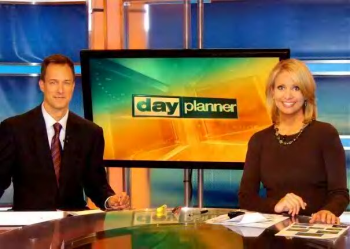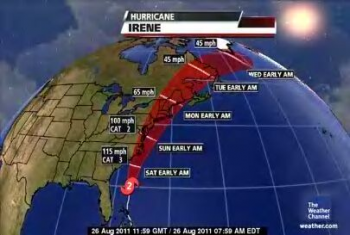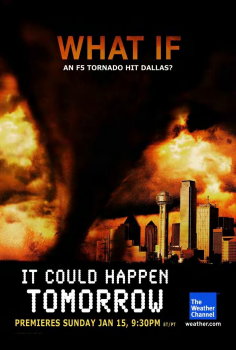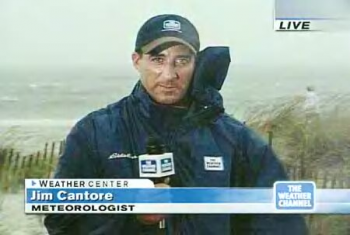The Dialectic of The Weather Channel
Doyle Greene / Independent Scholar
The Weather Channel (TWC) programming consists of continuous weather reporting along with weather-themed shows such as Full Force Nature, It Could Happen Tomorrow, Storm Stories, Storm Riders, and When Weather Changed History.1 While it doesn’t necessarily sound like gripping TV, TWC functions as a cultural and political discourse. More specifically, TWC can be read as constructing a dialectic between paternalistic meteorology, encouraging mass submission to the weather, and heroic meteorology, valorizing individual domination of nature. Ideologically, this becomes a dialectic representing the powerlessness of the masses versus the power of great individuals.
The bulk of TWC’s weekday daytime programming is Day Planner, which airs Monday through Friday from 10 a.m. to 4 p.m. (CST) with extended afternoon hours as current or potential severe weather conditions warrant.2 Despite the ostensible cheerfulness—the bright color emphasis of the visuals as well as the jazz and rock instrumental snippets that accompany the montages of regional weather radar maps—Day Planner’s emphasis is on the potential nuisances, possible risks, and pervasive threats posed by the given day’s weather conditions.3 Equally important, Day Planner proscribes the myriad precautions viewers need take.
During the winters of 2010-11 and 2011-12, coverage of the numerous snowstorms across America included advice on safe driving, what to include in roadside emergency kits, and how to avoid frostbite, hypothermia, and seasonal depression. In the summer of 2011, reports of record temperatures, heat indexes, and drought conditions in the South were accompanied by segments concerning heat stroke and wildfire prevention. Not surprisingly, Hurricane Irene was TWC’s primary focus between the latter half of August and early September 2011, with continuous coverage of the impending arrival, the probable hazards, live feeds of local and statewide press conferences regarding evacuation plans, city-by-city live reports of the hurricane’s impact, and the resulting widespread damage.
Indeed, while “day planning” programming is the constant, TWC’s raison d’être is extended live coverage of severe weather outbreaks as they happen and their immediate aftermath (e.g. the 2011 tornado that leveled Joplin, Missouri). Moreover, TWC’s speculative documentary series It Could Happen Tomorrow depicts hypothetical weather scenarios as guaranteed disasters waiting to happen: an earthquake decimating Las Vegas, a hurricane annihilating Tampa, a flash flood engulfing Boulder, or a wildfire incinerating San Diego. Weather safety experts not only extrapolate the eventual certainty of such events but sternly reproach any public apathy and lack of readiness while the correct course of action is manifestly clear: “You can’t beat Mother Nature,” “Run from the water, hide from the wind,” and “Don’t find yourself in this situation.” Ultimately, while Day Planner is routine and It Could Happen Tomorrow is apocalyptic, both shows are instructional. They act as a paternalistic meteorology for the masses, guiding them through their daily helplessness in the minutia and potential havoc of the weather. The message to the audience from TWC is they should always be prepared, always use precautions, and when things become too dangerous always run and hide.
Like many niche networks, TWC has cultivated a stable of stars and one of the most prominent of these is Jim Cantore. As TWC’s designated “storm tracker,” Cantore provides live, on-location reports of potential or actual weather calamities and their immediate aftermath, all in a manner that suggests the weatherman as protagonist of an Ernest Hemmingway novel (one might say, “for whom the barometer tolls”).4 He is also the star of Cantore Stories, a documentary series in which Cantore tours various regions across America in order to experience what they endure (summer in the Louisiana bayou, winter in International Falls, Minnesota) as well as the narrator of Storm Stories, inspirational chronicles of survival through individual and group heroism effort in moments of weather crisis.
In Dialectic of Enlightenment, Max Horkheimer and Theodor W. Adorno write that “all power in class society is tied to a nagging consciousness of its own impotence against physical nature and its social descendents—the many.”5 This ultimately becomes the ideological crux as well as the contradiction of TWC. While TWC continually reminds its audience of their powerlessness against the weather, it simultaneously valorizes those who actively dare to dominate nature at its most threatening. The underlying message is not only an affirmation of romanticized rugged individualism through the extreme outdoorsman; Jim Cantore is the most visible embodiment of heroic meteorology on TWC. While the many are taught to fear the weather, Jim Cantore is among the select few who are fearless against nature.6 As Horkheimer and Adorno stated in their critique of The Odyssey, “[T]he knowing survivor is also the man who takes the greatest risks when death threatens, thus becoming strong and unyielding when life continues.”7 As TWC ventures into the next maelstrom, Jim Cantore acts as TWC’s Odysseus while the TWC viewers are relegated to his oarsmen.
Amid America’s prevailing political climate (pun intended) of neoliberalism, TWC overtly emphasizes “personal responsibility” in dealing with the weather: individual preparation in the present decreases the cost of future disaster both in terms of money and life. However, the dialectic of TWC becomes more problematic. Paternalistic meteorology reminds the mass audience external regulation is a necessity component of daily life amid the continual promise—as opposed to threat—of imminent disaster whereas heroic meteorology emphasizes the great men who conquer the elements and, by extension, the cowed masses. TWC brands itself around the word “authority”: “Hurricane Authority,” “Winter Weather Authority,” “Severe Weather Authority.” In this way, TWC is not only self-promoted as television’s bastion of weather expertise, but the authority figure over the TWC audience by constructing a media citizenship as “one nation under the weather” governed by TWC. The issue becomes the degree TWC as America’s weather authority conflates paternalistic and heroic meteorology into weather authoritarianism.
Image Credits:
1. Carl Parker and Heather Tesch on Day Planner
2. TWC Coverage of Hurricane Irene
3. Promotional Image for It Could Happen Tomorrow
4. Where Storms Go, Jim Cantore Follows
Please feel free to comment.
- Weathering Disaster, a series about various people successfully rebuilding in the aftermath of storm damage, is sponsored by Farmers Insurance Group. It amounts to half-hour infomercials for Farmers Insurance. [↩]
- Weekend Now airs Saturday and Sunday from 10 a.m. to 1 p.m. (CST) and is geared towards “lifestyle weather” and precautionary recreational planning (picnics, the beach, a fishing trip, sporting events). [↩]
- In this respect, TWC avoids “atmospheric” New Age and ambient music in favor of instrumental music with more “drive” or “urgency” (bop, jazz-funk fusion, alternative, and classic rock such as Pink Floyd, the Allman Brothers Band, and Devo [↩]
- In the era of cross-marketing, one ponders the possibility of a Jim Cantore action figure. Facetiousness aside, the network does market a variety of TWC brand items (clothing, DVDs, etc) on the network’s on-line store: http://store.weather.com. [↩]
- Max Horkheimer and Theodor W. Adorno, Dialectic of Enlightenment, trans. John Cumming (New York: Continuum, 1998), 57. [↩]
- From the Edge with Peter Lik stars famed landscape photographer Peter Lik as a balls-to-the-wall version of Ansel Adams. Lik routinely ventures into the dangerous netherworlds of Death Valley or, in the context of Greek mythology, the Olympic Mountains in Washington in order to photograph nature where no man has photographed nature before. Storm Riders features Juston Drake and Simon Brewer, an intrepid duo of storm chasers whose success owes to a merger of high-tech acumen and gonzo attitude. The opening disclaimer of Storm Riders that viewers should not attempt the exploits of trained professional storm chasers could be rephrased as “Do as TWC says, not as TWC does.” [↩]
- Dialectic of Enlightenment, 47. [↩]




I think that this is a compelling argument; however, I would like to try to examine The Weather Channel as an entity (and by no means is it the only one) that is in the business of perpetuating its own myth for the sake of driving a cyclical consumption of its product and the way in which the argument that you made fits within this understanding. It is worth noting in what ways each of the programs that you mentioned (particularly Day Planner, It Could Happen Tomorrow, Storm Stories and Jim Cantore’s on-the-scene reports) feeds into the others, thus driving the perception of not only TWC as the authority on all things weather, but also as a benevolent authority whose message the viewer (or, perhaps, more accurately the non-viewer) ignores at his/ her own peril.
Rather than assume that TWC’s “raison d’être is extended live coverage of severe weather outbreaks as they happen and their immediate aftermath,” I would argue that everything revolves around and exists for the sake of Day Planner. As you say, Day Planner presents the audience with “the potential nuisances, possible risks, and pervasive threats posed by the given day’s weather conditions.” However, this information, in itself, is only valuable to the audience when it is understood as both dangerous and as that which may (and, as the other shows subtly and not-so-subtly demonstrate, likely will) occur in the future. While the danger of certain types of weather (tornadoes, flash floods, ice storms, etc.) may be thought of as a given for the majority of the audience, TWC must still compel this audience to return to the Day Planner at regular intervals. In order to do this, TWC must contextualize Day Planner, persuading the audience of the persistent threat of weather.
This, of course, is where Storm Stories, Cantore’s field reporting, and It Could Happen Tomorrow come into play. Storm Stories demonstrates the historical precedent of violent weather. In this way, it provides the reason that the audience should fear the weather and also the reason that it must seek out an authority so as to protect itself from the same misfortune that previously befell others. The hero, thus, is almost incidental to the story, serving as a sort of exception that proves the rule (“and if you listen to us, you too could be the exception!”). However, focusing on the past is not enough, for the audience can distance itself from the past (by virtue of thinking it exceptional), regardless of how horrifying the effects of the weather may have been.
And now we arrive at Cantore’s field reports, for they demonstrate the continuing reality of this threat. Cantore, further, fully decked out in TWC gear and prevailing in the face of dangerous weather (he lives to chase another storm), is not simply a man defying nature, but, as an extension of The Weather Channel’s brand, demonstrates TWC’s resiliency, it’s authority not just on nature but over nature as well.
It Could Happen Tomorrow serves to help the audience make the cognitive leap from “current threat occurring elsewhere” to “potential and almost certain threat to me.” TWC’s ability to dominate the threat of weather (as demonstrated by Cantore) is, thus, played upon when weather experts “sternly reproach any public apathy and lack of readiness.” That sense of readiness, of course, can only be provided by TWC itself (the paternalistic authority that you discussed in fantastic detail).
My argument, therefore, is that everything that TWC does is done in the interest of driving the audience to Day Planner. Rather than rebuff your own argument, I rather think that this contextualizes the notions of paternalistic and heroic meteorology. Whereas both are subordinate to the perpetuation of the myth, the heroic meteorology is subordinate to the paternalistic meteorology, for the heroism is merely played up in order to demonstrate the way in which TWC is absolutely vital to the individual audience member’s survival.
I think that it is also useful to use The Weather Channel as a case study for examining the self-perpetuation of the myth (of a given channel) and the cyclical consumption that such a practice drives. The Weather Channel, of course, is not the only station that perpetuates its own myth this way, but your work does provide us with a way of accessing the (occasionally) contradictory means taken by a station so that it may maintain its perceived purpose.
Thanks for this great critique of The Weather Channel’s social message! It reminded me of an article by Anna McCarthy on Reality Television: a Neoliberal Theater of Suffering in which she identifies a similar neoliberal message in “self improvement” reality shows such as Extreme Makeover: House Edition, and Random 1.
On a mostly unrelated note, your post got me thinking about the way in which reality based television presents and promotes the idea of a parallel ‘other’ world centered on the concept of invincibility; or perhaps more aptly, a world that as audiences, we are prevented from entering except transitively through the television medium. This concept is promoted explicitly in Jackass (and similar extreme stunt shows) in which the first few seconds of the show’s running time include a warning insisting that viewers not perform any of the ‘stunts’ shown in that week’s episode. The warning claims that MTV employs highly trained professionals. Just as in the example you provide with The Weather Chanel (Cantore is billed as a professional perfectly capable of handling the extreme weather he’s constantly facing), we are presented with a completely contradictory message which boils down to: “we can do these dangerous things, but you are not allowed to.” Within this message there seems to be an implication that “you will get yourself killed or seriously injured trying to do these things that we know how to do safely.”
Here it seems that despite the realism depicted in these programs (I’m now talking about both Cantore Stories and Jackass), they manage to portray a superhuman level of invincibility in the face of utter destruction and/or chaos. In other words, these shows are manufacturing an image of safety while simultaneously preventing us from entering this construct (except remotely).
Comedy Central’s hit show Tosh.0 tries to establish this same barrier by offering a legal disclaimer in the same vain as the one shown in Jackass, but since the bulk of the show’s content is made up of videos culled from YouTube and other user generated websites, they are unable to claim the use of professionals. This ends up shattering the concept of invincibility with everyday people constantly ending up on the show after having performed some sort of ludicrous physical stunt/injury.
In this way, Tosh.0 seems to act as a subversive force introducing a path in which audiences are actually allowed (even encouraged) to partake in the danger and violence they have previously been barred from.
I am curious to find out what blog platform you happen to be utilizing?
I’m having some minor security issues with my latest site and I would like to find something more secure. Do you have any recommendations?
I’ve provided this (admittedly overdue) addendum to account for some changes in TWC programming. Day Planner now airs from 11am-1pm (CST)while TWC afternoon and evening progamming alternates between TWC-produced shows and hour-long Weather Center Live updates. Extended live coverage of severe weather situations still preempts regular programming (as of this writing, TWC has provided around-the-clock coverage of Hurrican Isaac for the last several days).
As important, TWC recently moved into “on the job” reality shows like Coast Guard Alaska, Hurricane Hunters, Ice Pilots, and Lifeguard!Southern California. (The best comparison would be History shows like Ice Road Truckers and Great Lake Warriors.) These shows focus on people employed in dangerous professions and the arduous conditions they work in where, as one ad for Coast Guard Alaska put it, “Heroes don’t freeze.”
My view is that the new line of “triumph over nature” shows juxtaposed with “mass vulerability to the weather” shows represent an attempt to provide more balance in TWC’s dialectic of paternalistic meteorology (Day Planner, It Could Happen Tomorrow)and heroic meteorology (Jim Cantore, Coast Guard Alaska).
Hurricane Isaac, sorry for the typo!
Sometimes it’s hard to know who you are and what you want and whom you like and why you like that person.The answers change because you’re changing. Growing. But deep inside, you are you.You were you as a baby, you were you as a kid, and you are you right now. “Let me listen to me and not to them,” wrote Gertrude Stein. It makes sense to consider the advice and opinions of other people. But don’t let their noise drown out your inner voice. And don’t let the way you sometimes talk or behave in front of others make you lose sight of who you are when you are alone, when you are most you.